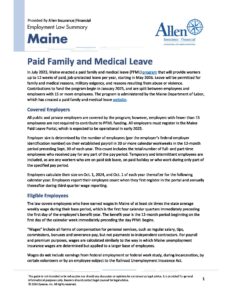As you advance in your career and hold jobs at various companies, you may discover at some point that you’ve left behind valuable cookie crumbs: a trail of employer-sponsored retirement accounts. Leaving previous plans with former employers saves you from having to take any action, and you still have the ability to roll them over later. If you prefer the investment choices with your old plan or that plan has lower fees than a new 401(k) or IRA, you might want this option. Also consider that you won’t pay a tax penalty for taking a distribution from your employer’s 401(k) after you turn 55, which you would pay on an early withdrawal from an IRA.
So, while there can be benefits and it may feel easier to leave them as they are, managing and keeping track of those cookie crumbs could become burdensome. Consolidating or rolling them over into one account is one way to alleviate that burden. Here is helpful information to help you decide whether a rollover is the best choice for you.
Benefits of a Rollover
Simplicity and streamlining. One major benefit of consolidating your retirement accounts into one account is that there’s less information to track. You’ll receive one statement, have only one retirement account to manage (with one password and one account number), and be able to see your overall financial picture more clearly by reducing multiple savings sources to one.
Avoiding overlap and easier rebalancing. When you have multiple retirement savings accounts, you might assume your investments are sufficiently diversified, but this may not be true. Over time, as portfolios shift due to market movement, rolling all of your accounts into one allows you to properly analyze asset allocation in one place instead of many.
Keeping track of RMDs. Starting at age 73, you must withdraw minimum amounts, called required minimum distributions (RMDs), from your retirement accounts each year. With multiple retirement accounts, it’s more difficult to calculate accurate RMD amounts and there are steep tax penalties for underestimating RMDs and missing the deadline. Combining accounts can help reduce these risks.
Potentially fewer fees. 401(k) plans incur various fees, including administrative, management, investment, and service charges. By combining accounts, you may pay fewer fees. In addition, you may be able to avoid certain fees altogether if fee reductions are dependent on the total account balance.
Estate-planning convenience. Thinking about your death isn’t pleasant, but it’s important to consider the responsibilities your loved ones and beneficiaries will have when you’re gone. With all of your retirement funds in one place, there will be less work for your family to do when tracking down your assets.
Your Rollover Options
Roll into your new employer’s 401(k) plan. If you have a new job and establish a retirement plan with your new employer, one option is to roll your previous account balance into your new plan. Requesting a direct rollover of funds from previous employer to new employer is a nontaxable transaction that retains creditor protection.
Roll into an IRA. Whether you’re switching jobs or retiring, rolling your retirement savings into an IRA might give you more flexibility in how you manage the money you’ve saved. IRAs often have a wider range of investment options that might not be offered by an employer’s 401(k) plan. In this type of account, your investments continue to grow tax deferred, meaning you’ll pay taxes upon withdrawal. Please note: You can’t borrow from an IRA as you can with a 401(k), and RMDs are still required at age 73.
Roth IRA. Withdrawing traditional, pretax assets from a 401(k) into a Roth IRA is known as a Roth conversion. By doing so, you will owe income taxes on the amount converted in the year of the transaction. One benefit of this strategy is that any additional earnings in the Roth IRA can grow and be withdrawn at retirement age tax free (as long as the withdrawal occurs at least five years after the Roth account was created).
Take a cash distribution. Although this option might seem appealing if you have debts or major expenses, there are many reasons not to withdraw your funds. One major drawback is potentially not having enough money to retire or maintain your lifestyle in retirement. In addition, you could pay significant penalties and taxes for early withdrawal.
Rollover Tips to Keep in Mind
Whether you roll over to a 401(k) or an IRA, these are trustee-to-trustee transfers where the money moves directly from one provider to the next. If you receive a check in your name, you may have inadvertently requested a withdrawal, which would result in owing income tax on the amount and additional penalties if you have not yet reached retirement age. If this occurs, contact the recordkeeper immediately to discuss a correction.
When considering a Roth, note that your 401(k) could have Roth or after-tax dollars already within it, and these assets will transfer to a Roth IRA without additional taxes. Contact the recordkeeper to determine if the dollars in your 401(k) are on a pretax or post-tax basis—or a mix of both.
If you are considering rolling over money from an employer-sponsored plan, you often have the following options: leave the money in the current employer-sponsored plan, move it into a new employer-sponsored plan, rollover to an IRA or cash out the account value. Leaving money in plan may provide special benefits including access to lower-cost investment options; educational services; potential for penalty-free withdrawals; protection from creditors and legal judgments; and the ability to postpone required minimum distributions. If your plan account holds appreciated employer stock, there may be negative tax implications of transferring the stock to an IRA. Whether to rollover your plan account should be discussed with your financial advisor and your tax professional.
© 2023 Commonwealth Financial Network®








